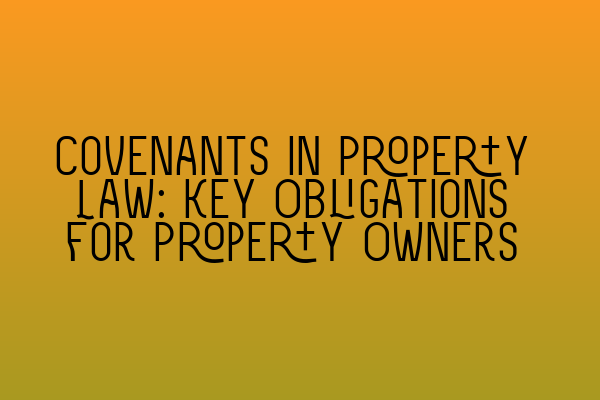Covenants in Property Law: Key Obligations for Property Owners
When it comes to property ownership, there are various legal obligations that property owners must be aware of. One such obligation is a covenant. Covenants, also known as restrictive covenants or property restrictions, are legal agreements that bind property owners to certain obligations and restrictions.
Understanding covenants in property law is essential for property owners to ensure that they comply with the agreed-upon terms and avoid potential legal issues. In this blog post, we will explore the key aspects of covenants and the obligations they impose on property owners.
What is a Covenant?
A covenant is a legal agreement in which one party (the covenantor) agrees to perform or refrain from performing certain actions in relation to a property, while another party (the covenantee) benefits from these obligations or restrictions. Covenants can be created through written agreements, such as deeds, contracts, or leases, and are registered with the Land Registry.
There are two types of covenants that property owners should be familiar with: positive covenants and restrictive covenants. Positive covenants require the covenantor to perform certain actions, while restrictive covenants restrict the covenantor from doing certain things.
Key Obligations in Positive Covenants
Positive covenants impose specific obligations on the property owner to take certain actions. These obligations may include:
- Property maintenance and repairs: Property owners may be obligated to maintain the property in good condition and make necessary repairs to ensure its preservation.
- Paying service charges: In certain cases, property owners may be required to pay service charges to cover the costs of communal services or facilities shared with other property owners.
- Contributing to shared expenses: Property owners in a shared development may have to contribute to shared expenses such as road maintenance, landscaping, or communal facilities.
It is important for property owners to understand the positive covenants applicable to their property and fulfill their obligations accordingly. Failure to comply with positive covenants can lead to legal disputes and potential financial repercussions.
Restrictions Imposed by Restrictive Covenants
Restrictive covenants, on the other hand, impose limitations on the property owner’s actions and use of the property. These limitations may include:
- Building restrictions: Property owners may be restricted from making certain architectural changes, adding extensions, or altering the property’s appearance.
- Land use restrictions: Restrictive covenants may limit the use of the property for specific purposes, such as prohibiting commercial activities or restricting the type of livestock that can be kept on the land.
- External modifications: Property owners may be restricted from painting the property in certain colors, installing specific outdoor fixtures, or making alterations visible from the public domain.
Compliance with restrictive covenants is crucial to avoid legal consequences. Property owners should thoroughly review any restrictive covenants associated with their property to ensure they are aware of the limitations imposed.
Enforcement of Covenants
Enforcement of covenants can be initiated by the covenantee or by other affected parties, such as neighboring property owners or residents. If a property owner breaches a covenant, the covenantee can seek legal remedies, including:
- Injunction: A court order that requires the breaching party to stop or start a specific action.
- Specific performance: Court-ordered enforcement of the covenant, requiring the breaching party to comply with the agreed-upon obligations.
- Compensation: The covenantee may seek financial compensation for any losses or damages resulting from the breach of covenant.
It is important for property owners to be aware of the potential consequences of covenant breaches and the remedies that can be pursued by the affected parties.
Conclusion
Covenants play a crucial role in property law, ensuring that property owners understand their obligations and restrictions. Property owners should carefully review any covenants associated with their property, whether positive or restrictive, to ensure compliance and avoid potential legal disputes.
If you have any questions or require legal advice regarding covenants or other property law matters, contact SQE Property Law & Land Law. Our team of experienced solicitors can provide you with expert guidance and assistance.
Related Articles:
